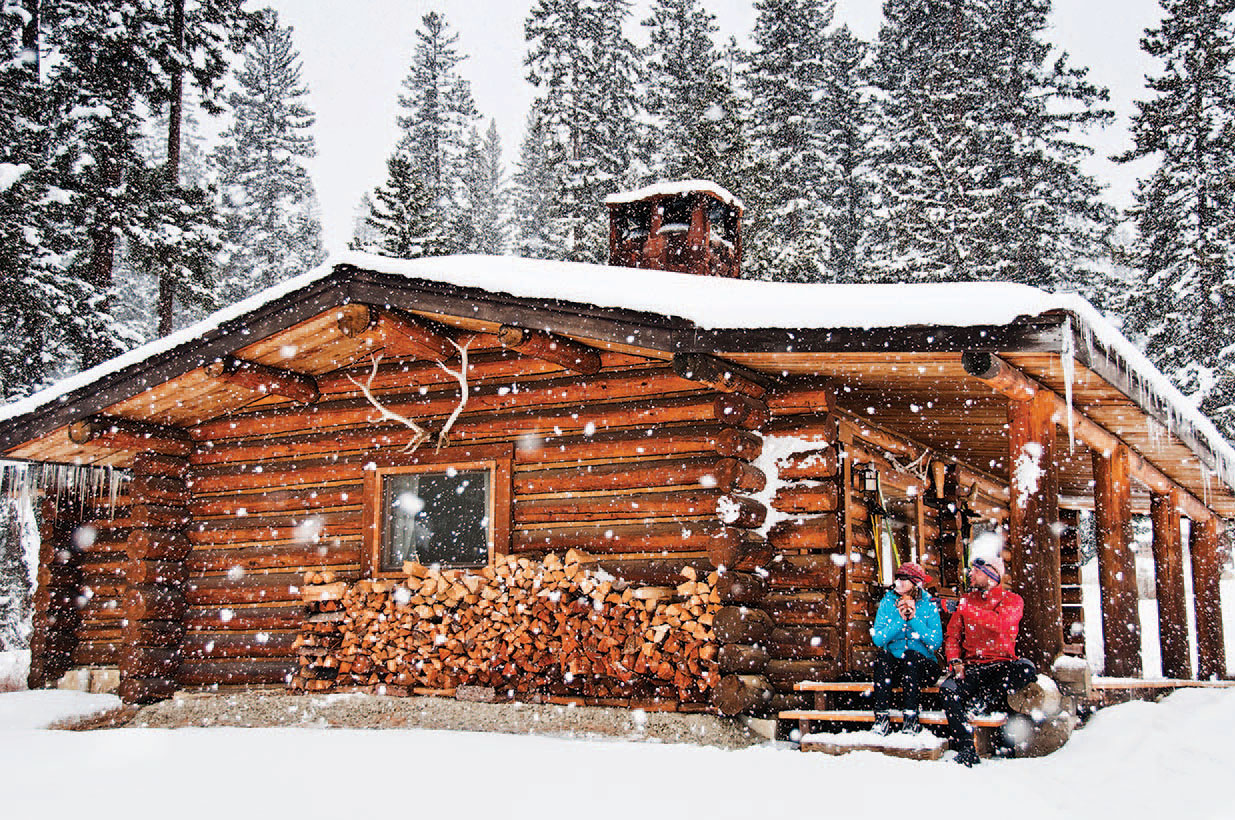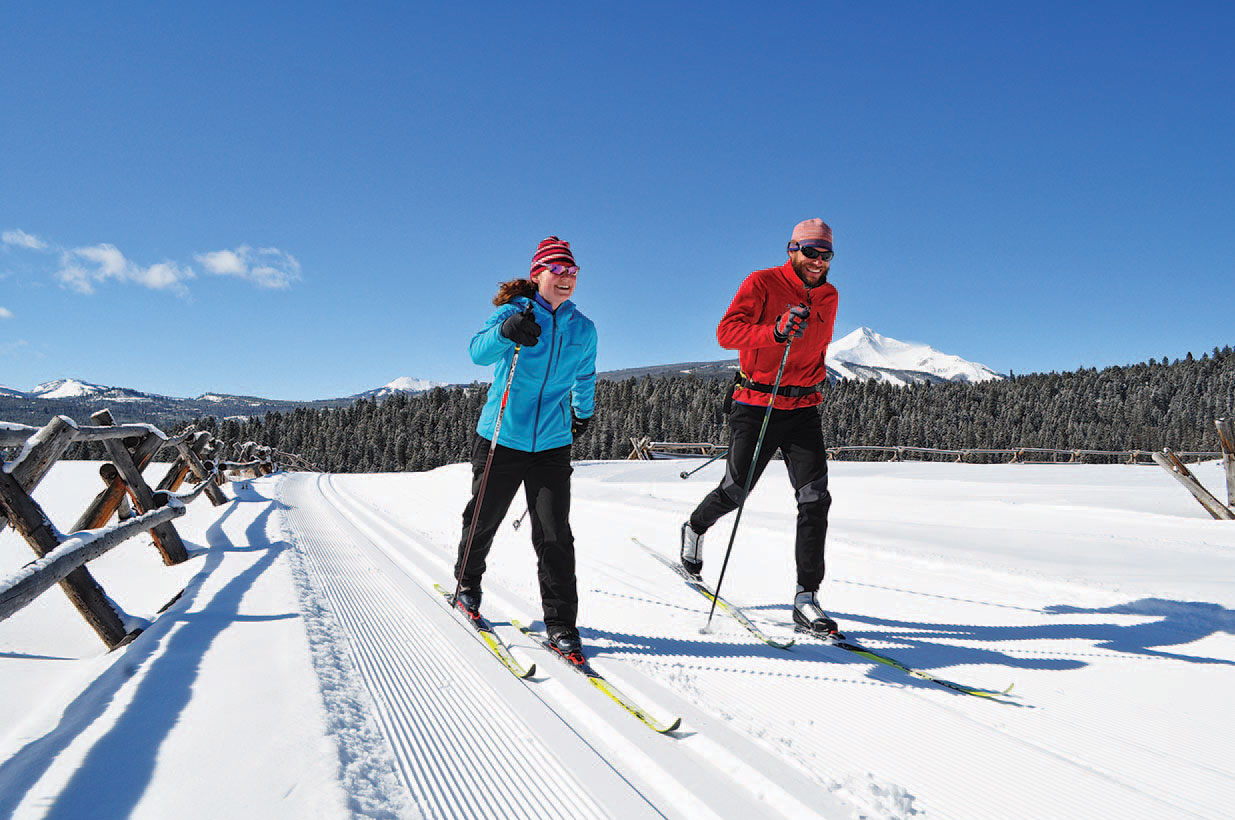For winter wonder and reverie, you can hardly do better than cross-country in Montana.
I have lived in the north country for a long time now — 30 years — and it is with a strange sense of satisfaction that I realize I have turned into a cliché. I could be a Vermonter, or Coloradan, not a Montanan, so much have my passions morphed me into the person I used to see from a distance: a wearer of old Army-Navy wool pants, possessor of a beard-in-winter. I drive a Subaru. I like granola. I’m getting old.
All my life, I’ve been seeing people who look like I am now, blissing out on their long skinny wooden skis, gliding through the woods. Twenty-two thousand years ago, Cro-Magnons chased reindeer across the Greenland ice cap — the northern top of the world — on long skinny skis. How wedded are these wooden boards to us as a species? Their invention predates the wheel by roughly 3,500 years. For 3,500 years, we did just fine without Subarus. We skied everywhere instead.
In some ways, cross-country skiing is the antithesis of downhill skiing. In the latter, of course, you follow the currents of gravity, whereas in the former, you are often your own gravity, your own motor, your own engine: To keep moving forward, you must keep moving forward. No one and nothing else are going to achieve that glide for you. Because of this, there’s a bit of a blue-collar, pack-your-lunchbox-to-work pride that comes from that simple repetitive gesture and which, I maintain, is far healthier for us than we realize — and far more, these days, perhaps, than ever before.

I’ve done both, at different stages of my life, and have friends in both camps, and am convinced that the physical firepower and mental joy of both are more closely connected and codependent than can be imagined. The high-octane thrill of the downhill leap — x units of adrenaline ignited, and burned, incandescent, over the span of, say, five minutes of pure speed — is instead attenuated in cross-country skiing to be apportioned over a much longer period of time.
And at this point in my life I would prefer my burning to last longer, not shorter. I actually think the burning is superior in cross-country; that the two hours, or five or six, exceeds that of the sustained pleasure of even the most volatile of adrenaline bombs in downhill skiing. There is not a right or a wrong in this discussion — cross-country versus downhill. But I’m glad that I’m in the minority.
I’m glad that I’ve pretty much got the whole loop of Big Sky to myself this weekday morning. The locals are complaining — lamenting — that there was barely enough snow this year and that this weekend that I’m here might be the very last day of the year that their low-elevation trails will be able to be open. Many of the stretches are icy, fast, gritty, raspy, and brilliant with the glaze of thawing, refreezing, melting, refreezing, with each mild night, each bright warm day. But I’ve come here only for the weekend, and I try not to think about any of that. Instead, this one morning, I feel like one of the richest people in the world to be gliding, skating, on my new rental gear, the easy-clip bindings so superior to my 40-year-old beater three-pins. Though still, the motion is the same, the poles are the same length, the warm-day snow feels the same underfoot. It’s like skating across the surface of a frozen lake; it’s like skating through the wind, east to Siberia.
So often in our daily lives, which are filled increasingly with fragmentation and quick-buzz stimulations so relentless that they soon yield, paradoxically, the condition of numbness, we find ourselves confused and adrift, in the doldrums, without purpose. It can be a feeling strangely like exhaustion, and all the more odd in that we have not labored. But in the winter, on skis, in the solitude and silence of one’s own body, the body remembers, when on the long skinny skis, and when gliding across the back of winter. In such sport, such activity, you’re gloriously a part of winter, and yet — again, that word — you’re paradoxically escaping it, departing something powerful and elemental, without leaving — you’re defeating a force that seeks to pull you down. And in this, for this, you are victorious. You can feel yourself also becoming the winter, accommodating it, and being accommodated by it, with the shape of your glide, the work of your thighs and back and shoulders, your arms and your ankles, brokering that acceptance by and of each other, yourself, and winter. And your body as well as your mind remember an older being, a type of person who existed before the onslaught of the contemporary fragmentation and breaking-apart of days and hours. Your mind and body remember a quieter time, if not a silence, and you move through the short, cold days under your own power.

One day, and soon, you realize the weather is changing. You’ve long ago given up fighting or hating the cold and the snow and have come to love it. The sound you hear in the forest is that of water running; the snow is going away, and going away fast. It’s gotten too warm, too early, the next season is already here, like noisy, uninvited houseguests with lots of luggage, or as if those guests, though expected, have shown up far too early and utterly unannounced, and never mind that you love them, too, in a far different way than winter. The point is, you weren’t ready. Where you once felt rich, as more and more snow came pouring down, you now feel poor. Where once you felt graceful, you now feel off-balance. More and more, soil appears from beneath the warming snow, small islands of earth growing ever larger, as if the world is not being lost but is instead being newly made. And once again, you must start all over, learning to fit its strange beauty and its ever-changing rules, its wild vagaries, which seem at first to have nothing at all to do with you and that strange and slightly adrift feeling you experience, as you wait and watch the cold short days grow dark.
I don’t think you should necessarily do something simply because it keeps you sane, like some kind of medicine, or therapy — well, you should, but what I mean is, how much better it is to do something for love rather than, say, health or physical fitness. Still, it is so healthy. When I am cross-country skiing, I can feel a ravaged mind — stress-fretted by the century and a thousand demands, and 10,000 claims upon the heated mercurial mind’s attentions — grow smoother, calmer, less jumpy. It’s a feeling as simple as it is profound. The body connects to the feeling, longs for it.
Again and again I keep coming back to this idea that it, cross-country skiing, heals a stressed mind: that the exertion and repetition fill the mind with white. That’s been my experience, at least. I never sleep as well as I do after a day of skiing. I also love the old-school ethos of it: no tow ropes, no chairlifts. You are responsible for healing yourself. There is a muscular accounting.
On cross-country skis, going around and around in long loops at dusk, ending up eventually at the point where you began, you become almost always a better version of yourself. The Norwegian polar explorers of the 19th century knew these winter rhapsodies well. “Where can one find a healthier and purer delight than when on a brilliant winter day one binds one’s ‘ski’ to one’s feet and takes one’s way out into the forest?” Fridtjof Nansen asks in his 1890 classic The First Crossing of Greenland. “Can there be anything more beautiful than the northern winter landscape, when the snow lies foot-deep, spread as a soft white mantle over field and wood and hill? Where will one find more freedom and excitement than when one glides swiftly down the hillside through the trees, one’s cheek brushed by the sharp cold air and frosted pine branches, and one’s eye, brain, and muscles alert and prepared to meet every unknown obstacle and danger which the next instant may throw in one’s path? Civilization is, as it were, washed clean from the mind and left far behind with the city atmosphere and city life; one’s whole being is, so to say, wrapped in one’s ‘ski’ and the surrounding nature. There is something in the whole which develops soul and not body alone, and the sport is perhaps of far greater national importance than is generally supposed.”
I’ll have whatever Fridtjof was having!
It’s only mid-February. It’s the last weekend the cross-country loop in Big Sky will be open. Spring is coming already, the green fire roar of it. I’ll be shedding the wool soon. The blue smoke from wood stoves will give way to yellow sunlight. Winter, and snow, went away so fast this year. This is my favorite thing about cross-country skiing: It reorders time into units that are more manageable. One can pretend that this is the natural condition of things; that the sleeping beast of winter is the way time will behave, always.
From the January 2017 issue.














